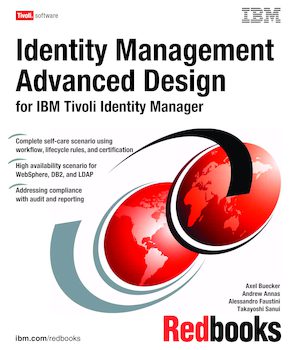Identity Management Advanced Design for IBM Tivoli Identity Manager
An IBM Redbooks publication
Note: This is publication is now archived. For reference only.

Published on 28 August 2006, updated 22 May 2008
ISBN-10: 0738494879
ISBN-13: 9780738494876
IBM Form #: SG24-7242-00
Authors: Axel Buecker, Andrew Annas, Alessandro Faustini and Takayoshi Sanui
Identity and user lifecycle management projects are being deployed more and more frequently - and demand is growing. By demonstrating how IBM Tivoli Identity Manager can be made resilient and adapted to special functional requirements, this IBM Redbooks publication creates or enhances confidence in the IBM Tivoli Identity Manager-based solution for senior management, architects, and security administrators.
Advanced design topics can start with infrastructure availability for all involved components, Web application, and database server clustering as well as LDAP multi-master setups, continuing with compliance challenges addressing enhanced auditing and reporting, and designing and creating your own self-care/self-registration application environment that embraces external users and business partners offering fine-tuned workflow options and lifecycle management capabilities.
The powerful features and extensions of IBM Tivoli Identity Manager are opening doors into a world of advanced design and customization for every identity management challenge you might encounter.
Part 1. Advanced Identity Topics
Chapter 1. Advanced design overview
Chapter 2. Architect a high availability solution
Part 2. Customer scenario
Chapter 3. Tivoli Austin Airlines, Inc.
Chapter 4. Project design
Chapter 5. Technical implementation phase I
Chapter 6. Technical implementation phase II
Part 3. Appendixes
Appendix A. Corporate policy and standards
Appendix B. Source code
Appendix C. Additional material